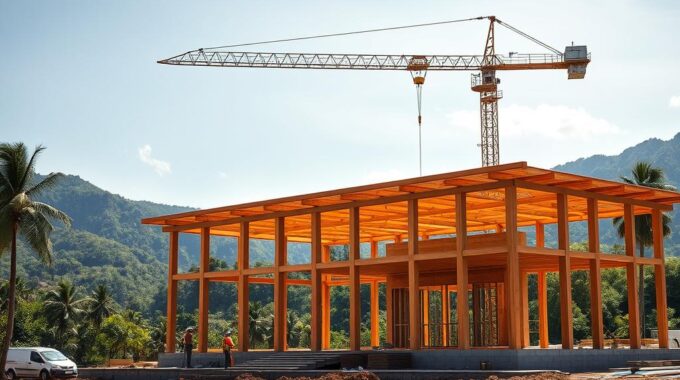Discover competitive personal-loan-options-dominical-costa-rica with GAP Equity Loans. We connect borrowers with private investors, offering lower fees and flexible financing options.

Equity Loan Guidance in Costa Rica | GAP Equity Loans
Did you know that GAP Equity Loans can approve your application in just 7 to 10 business days? This is significantly faster than traditional banks, which often take weeks or even months. If you own property in Costa Rica, you can unlock its value to access funds for your needs.
A home equity loan allows you to use your property as collateral. This means you can secure funds ranging from $50,000 to over $1,000,000. With flexible terms from 6 months to 3 years, this option is ideal for those seeking quick and reliable financing.
At GAP Equity Loans, we specialize in providing competitive interest rates and simpler qualification requirements. Whether you’re looking to invest, renovate, or cover unexpected expenses, our team is here to help you make the most of your property’s value.
Understanding Home Equity Loans in Costa Rica
Home equity loans are a powerful financial tool for property owners in Costa Rica. They allow you to borrow against the value of your home, providing access to funds for various needs. Whether you’re planning renovations, consolidating debt, or investing, this option can be a game-changer.

What Is a Home Equity Loan?
A home equity loan lets you use your property as collateral. The amount you can borrow depends on your home’s appraised value and any existing debt. In Costa Rica, you can typically borrow up to 50% of your property’s value.
This type of loan is ideal for those who need a lump sum of cash. It’s secured by your home, which often results in lower interest rates compared to unsecured loans.
How Home Equity Loans Work in Costa Rica
To qualify, your property must have sufficient equity. Lenders will assess its value and calculate the loan-to-value (LTV) ratio. This ratio determines how much you can borrow.
Interest rates for these loans usually range from 12% to 16%. They are competitive compared to other financing options in the region. The application process is streamlined, making it faster than traditional bank loans.
Here are some key points to consider:
- Collateral: Your home secures the loan.
- LTV Ratio: Determines borrowing limits.
- Interest Rates: Typically lower than unsecured loans.
- Common Uses: Renovations, debt consolidation, or investments.
By leveraging your home equity, you can access the funds you need while keeping your financial goals on track.
Benefits of Using Your Property as Collateral
Using your property as collateral can unlock financial flexibility and competitive advantages. This approach allows you to access funds while leveraging the value of your home. It’s a smart option for those seeking tailored financing solutions.
Competitive Interest Rates and Lower Fees
One of the key benefits is access to competitive interest rates. By using your property as collateral, you can secure lower rates compared to unsecured loans. This reduces your overall financing costs.
Additionally, the fee structures are often more affordable. Traditional banks may charge higher fees, but private lenders like GAP Equity Loans offer transparent and cost-effective options.
Flexible Financing Options for Your Needs
Property-backed loans provide flexibility in terms of loan amounts and repayment schedules. Whether you need a small loan or a significant investment, you can find an option that fits your needs.
Approval processes are also streamlined, often completed in as little as 5 to 10 business days. This is much faster than traditional banks, which can take weeks or months.
By leveraging your property’s value, you gain access to funds that can support your financial goals. Whether it’s for renovations, investments, or other needs, this option offers both convenience and value.
Navigating the Home Equity Loan Application Process
Applying for a home equity loan in Costa Rica is straightforward when you know the steps. We’ll guide you through the process, from gathering documents to receiving funds. This ensures you can meet your financial goals with ease.
Documentation and Appraisal Steps
To start, you’ll need to provide essential documents. These include proof of income, property titles, and recent bank statements. Lenders use these to assess your financial stability and property value.
Next, your property will undergo a detailed appraisal. This step determines how much you can borrow based on its current market value. A thorough appraisal ensures you receive the right loan amount for your needs.
Approval and Disbursement Timelines
Once your documents and appraisal are complete, the approval process begins. At GAP Equity Loans, we aim to approve applications in just 7 to 10 business days. This is faster than traditional banks, which can take weeks or months.
After approval, funds are disbursed promptly. This allows you to address your financial goals without unnecessary delays. Whether it’s for renovations, investments, or other needs, we ensure a smooth and efficient process.
For more details on property appraisals, visit our refinance loan appraisals page.
equity-loan-guidance-in-costa-rica: Tools and Tips
Navigating the equity loan landscape in Costa Rica can be easier with the right tools and tips. Private investors and specialized lenders like GAP Equity Loans offer solutions tailored to your needs. These options often come with lower costs and faster funding compared to traditional banks.

Leveraging Private Investors and Lenders
Private lenders provide competitive terms, including lower closing costs and quicker approvals. By choosing a specialized lender, you can save time and money while reaching your financial goals. Here’s how to make the most of this choice:
- Compare costs and terms to find the best fit for your needs.
- Use online calculators to estimate your available loan amount based on your property’s value.
- Seek lenders who offer simplicity and prompt service.
Private lenders often have streamlined processes, reducing paperwork and approval times. This makes them a practical choice for property owners in Costa Rica. Whether you’re planning renovations or consolidating debt, these lenders can help you achieve your goals efficiently.
For more information on tailored financing options, visit our personal loans page. Our team is here to guide you every step of the way.
Tailored Financing Solutions Offered by GAP Equity Loans
GAP Equity Loans provides tailored financing solutions to meet diverse financial needs. Whether you’re investing in real estate or renovating your property, we offer flexible options to help you achieve your goals. Our services are designed to provide quick access to funds with competitive terms.

Loan Amounts, Interest Rates, and Term Options
We offer loan amounts ranging from $50,000 to $1,000,000, catering to various financial needs. Our interest rates start at 12%, making it a cost-effective choice compared to traditional mortgages. Loan terms are flexible, from 6 months to 3 years, allowing you to choose a plan that fits your budget.
Market conditions and property valuations play a key role in determining your loan amount. By using your property as collateral, you can unlock its value and secure the funds you need. This approach ensures you get the best possible terms for your investment.
Streamlined and Fast Approval Process
Our approval process is designed for speed and efficiency. Decisions are typically made within 7 to 10 business days, much faster than traditional banks. This allows you to access funds quickly and focus on your financial goals.
For a smooth experience, we recommend preparing your documents in advance. Visit our loan evaluation preparation page for detailed guidance. Our team is here to support you every step of the way.
Considerations for Expats and Costa Rican Homeowners
Expats and local homeowners in Costa Rica face unique financial challenges when seeking financing options. Understanding the eligibility criteria and Loan-to-Value (LTV) requirements is crucial for both groups. By leveraging property value effectively, you can maximize your borrowing power and secure the funds you need.
Meeting Eligibility and Loan-to-Value Requirements
For homeowners, eligibility often depends on property value and existing debt. Lenders assess the LTV ratio to determine how much you can borrow. In Costa Rica, this ratio typically allows up to 50% of your property’s value. Expats may face additional requirements, such as proof of residency or income.
Using property value wisely can increase your borrowing potential. For example, a higher appraisal can lead to a larger loan amount. This is especially useful for expats who may need to meet stricter financial criteria compared to local homeowners.
Financing options vary between expats and locals. Expats often benefit from private lenders who offer faster approvals, sometimes within 5 to 10 business days. Local homeowners may have access to traditional bank loans, but these often come with longer processing times and stricter requirements.
To prepare for the application process, gather essential documents like proof of income, property titles, and bank statements. Understanding both local and expat-specific lending criteria will help you navigate the process smoothly and secure the financing you need.
Expert Strategies for Home Financing
Effective home financing strategies can significantly enhance your property’s value and secure your financial future. By leveraging expert advice, you can make informed decisions that align with your long-term goals. Here’s how to maximize your property’s potential and manage risks effectively.
Maximizing Your Home’s Value
To increase your property’s estate value, focus on strategic improvements. Renovations, landscaping, and energy-efficient upgrades can boost market appeal. These enhancements not only improve your living space but also attract potential buyers or renters.
Another key strategy is to monitor market trends. Property values in Costa Rica have risen steadily, especially in tourist hotspots. Staying informed about local real estate dynamics helps you make timely decisions to maximize returns.
Smart Financial Planning and Risk Management
Creating a solid financial plan is essential for successful home financing. Start by assessing your budget and setting clear goals. This ensures your financing aligns with your long-term objectives, whether it’s investing, renovating, or consolidating debt.
Risk management is equally important. When borrowing against your property equity, consider factors like interest rates and repayment terms. Private lenders often offer competitive rates and faster approval processes, reducing uncertainties in the business of home financing.
Here are some expert tips to guide you:
- Work with professionals to develop a tailored financing plan.
- Use online tools to estimate loan amounts based on your property’s value.
- Prepare all necessary documents in advance to speed up the approval process.
By following these strategies, you can make informed decisions that enhance your property’s value and secure your financial future.
Conclusion
Unlocking the value of your property can be a game-changer for your financial goals. By leveraging your home equity, you gain access to competitive rates, flexible terms, and quick approval times. This approach allows you to turn your home value into a powerful financial tool.
At GAP Equity Loans, we simplify the process, ensuring you can secure funds in as little as 7 to 10 business days. Our tailored solutions are designed to meet your unique needs, whether it’s for investments, renovations, or other financial priorities.
Take the next step toward financial empowerment. Reach out to GAP Equity Loans today to explore how you can maximize your property’s potential and achieve your goals with confidence.
Article by Glenn Tellier (Founder of CRIE and Grupo Gap)



